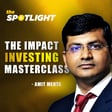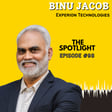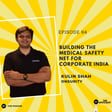Become a Creator today!Start creating today - Share your story with the world!
Start for free
00:00:00
00:00:01

Careers in Logistics-Tech Startups | Pranay Prakash of Delhivery
“Culture ke naam pe dresscode chipkana - is not something I am a big fan off!” - Pranay Prakash.
From a student who had to drop out of his military training due to an injury, to starting his first job as a field recruiter and the journey that he took to becoming the Head of Supply Chain HR at Delhivery (India’s leading fulfilment platform for digital commerce). Here is Pranay Prakash’s success story captured through a candid interview on The Spotlight.
Here are the key takeaways from this episode:
- How young graduates & freshers can shape their careers
- Using technology as an enabler to empower existing workforce & systems
- Insights into logistics operations as a career path
- Two key soft skills required to excel in the logistics industry.
- Bringing equality & breaking stereotypes in recruitment
Transcript
Introduction to Beyond Campus Podcast
00:00:00
Speaker
Akshay, did you always knew what you wanted to do when you passed away to the MBA? I was all over the place. Sort of, what about you? I was confused about your career choices. Wondering what steps to take next.
00:00:18
Speaker
In this podcast called Beyond Campus, Saurabh Garg, founder of C4E and Akshay Dutt, founder of Gunati are on a mission to crack open the career success code for the youth. So let's turn the dream into reality.
Guest Introduction: Pranay Prakash
00:00:40
Speaker
My name is Pranay Prakash and I head the people operations for delivery.
00:00:47
Speaker
Have you experienced the joy of having that fancy new phone you order delivered to you the very next day? Or the convenience of having those essential medicines coming to your toaster? I cannot imagine a time before online shopping and the same day delivery became a part of my busy life. And this is made possible by companies like Delivery, a logistic tech startup which handles the delivery operations of all the major e-commerce companies in India.
00:01:17
Speaker
Today, Akshay Dutt is in conversation with Pranay Prakash, Head of Supply Chain HR at Delivery, where he talks about his career, which spans across sectors like staffing, retail, mining, EPO, before joining delivery in the HR function five years ago. Here's Pranay talking about his first HR job. I come from a very small town called Patna in Bihar.
00:01:44
Speaker
And then I moved to Delhi. So I passed out from the campus. Commerce graduate. Then I went to the Indian Military Academy. I got trained there. Unfortunately, I had to be boarded out when I came back.
Early HR Roles and Career Development
00:02:04
Speaker
But
00:02:06
Speaker
That was very, very valuable. It's more like a life training than anything else. So, I tried catching up with friends. I tried catching up with friends. I tried catching up with friends. I tried catching up with friends. I tried catching up with friends. I tried catching up with friends. I tried catching up with friends. I tried catching up with friends. I tried catching up with friends. I tried catching up with friends. I tried catching up with friends. I tried catching up with friends. I tried catching up with friends. I tried catching up with friends. I tried catching up with friends. I tried catching up with friends. I tried catching up with friends. I tried catching up with friends. I tried catching up with friends. I tried catching up with friends. I tried catching up with friends. I tried catching up with friends. I tried catching up with friends. I tried catching up with friends. I tried catching up with friends. I tried catching up with friends. I tried catching up with friends. I tried catching up with friends. I tried catching up with friends. I
00:02:32
Speaker
So, I was able to get recruiters to interview me. So, I was able to do a sales process and hire a client. So, I was able to do a sales process. So, I was able to do a sales process. So, I was able to do a sales process. So, I was able to do a sales process.
00:02:50
Speaker
I went inside, called a couple of seniors, and I was like... So I went inside, I spoke a couple of guys. You remember Raj Nikki, who used to head Delhi NCR, Mr. Mahesh Bhatt who used to head, I think the entire North at that point in time.
00:03:15
Speaker
So that is how it all started.
Transition to Retail HR
00:03:26
Speaker
So my first job started as a field recruiter. I still remember BACS. So that was the plan which was assigned to me.
00:03:42
Speaker
So, the field came, metered, built distribution, maintenance, drivers. And then, I think very shortly, the recruiters who hired me, who kind of, you know, processed my data to the seniors, they started reporting on to me. And this was like within a month, month and a half, kind of. And then I was taken up as a group account manager. So, my account manager,
00:04:10
Speaker
and that is where the journey basically started and that is how one thing which life taught me during that phase is because
00:04:36
Speaker
So that is where we started. I got a call from somebody in Reliance Retail. Reliance Retail was setting up in Delhi and CR.
00:04:53
Speaker
And I met Mr. Chandra, Mr. Rohit Chandra, who was the head of HR. And one motivation was the reliance on the retail industry.
00:05:38
Speaker
So that is how the retail journey started.
00:05:44
Speaker
So that is the store that we started hiring for initially. I still respect her a lot because she taught me a lot.
00:05:56
Speaker
During those days, there was no need to make a policy about jobs, advertising, or the public marketing, or media marketing. There was no need to make a portal or anything like that. Otherwise, there was no need to make a blue-collar or anything like that. So, I had a lot of experience, I had a lot of experience, I had a lot of experience, I had a lot of experience, I had a lot of experience, I had a lot of experience, I had a lot of experience, I had a lot of experience, I had a lot of experience, I had a lot of experience, I had a lot of experience, I had a lot of experience, I had a lot of experience, I had a lot of experience, I had a lot of experience, I had a lot of experience, I had a lot of experience, I had a lot of experience, I had a lot of experience, I had a lot of experience, I had a lot of experience, I had a lot of experience, I had a lot of experience, I had a lot of
00:06:25
Speaker
I don't know if the local market is good or not, but I don't know if the market is good or not. I don't know if the market is good or not, but I don't know if the market is good or not. I don't know if the market is good or not, but I don't know if the market is good or not. I don't know if the market is good or not, but I don't know if the market is good or not. I don't know if the market is good or not.
00:06:47
Speaker
I would not name the company, but I would call it Shuru Karnata. And I would call it the company retail Shuru Karnata. I would call it the company retail Shuru Karnata.
00:07:22
Speaker
So that is how we learned that you need to take special care of that.
00:07:32
Speaker
So that was one learning that we got after having worked for a while there.
00:07:47
Speaker
And then I moved on to a couple of more assignments. One was because Rohit Chandra was moving out from the land's retail. And I was like, I was like 24-25 years old. So that is how I moved to India.
00:08:08
Speaker
It is what able to I think was put a reliance case tend to give which I still share with people as an experience as a learning
00:08:15
Speaker
I am the CEO of Mr. Navneet Saluja. He is the CEO of the Fairwell team. Mr. Navneet Saluja was there for the
Joining Delivery and Career Contributions
00:08:25
Speaker
Fairwell team. He has been there for a long time, especially since his team has been working with him for a long time. So Mr. Saluja, what are you learning and earning? What are you learning and earning?
00:08:40
Speaker
I have a career in learning and learning. I have a career in 12 years, 15 years, 20 years, 30 years. I have a career in learning and quality. I have a change in my life.
00:08:55
Speaker
As compared to the initial days of your career, all the things that have come up in your career, you know, you know, you know, you know, you know, you know, you know, you know, you know, you know, you know, you know, you know, you know, you know, you know, you know, you know, you know, you know, you know, you know, you know, you know, you know, you know, you know, you know, you know, you know, you know, you know, you know, you know, you know, you know, you know, you know, you know, you know, you know, you know, you know, you know, you know, you know, you know,
00:09:27
Speaker
See this is how you want to shape up your career and this is how you should shape up your career. And then you'll have another problem here.
00:09:47
Speaker
I think of all the things that we did there, right from sourcing advertisement, and that was all about the blue
00:10:08
Speaker
And that happened on the last day that I was with Reliance. There was an organization called Air Hostess Academy that was more of a distress assignment.
00:10:22
Speaker
because Mr. Chandrajar at the real answer to what I said to Nikal Nada. That was a very brief stint. The organization unfortunately shut down. So I was there only for about seven, eight months.
00:10:37
Speaker
From there, I went to another organization called VideoCon Telecommunication. One of my seniors from AHA, the Air Hostess Academy, he had joined at VideoCon. And he had probably seen me working here like the way probably I worked. I'm hoping that. So he was the one who called me at VideoCon.
00:10:57
Speaker
And that was the last time that I've ever given an interview. It has only been a word of mouth. Which is a good thing I'm particularly proud of right now also.
00:11:13
Speaker
So video can't make up your chest and the telecom set up can't make up your mobile handset.
Experience at SARA International
00:11:20
Speaker
The D2H business can't help you to extend your team's score. Unfortunately, that was around the time when the telecom scam broke out. So the business did not take up much actually.
00:11:39
Speaker
From video corner I moved to this organization called SARA International. Now that was I think a very very informed choice because
00:11:50
Speaker
What I liked about this organization was one was community trading which was like coal, iron ore and all that. And second was they had a manufacturing plant which was in Nalagarh which is close to Chandigarh. Which is the mining heartbed of India.
00:12:19
Speaker
And the factory was a completely different experience. There was another example where you could learn from your junior. So there was this guy there.
00:12:34
Speaker
And he was a very seasoned guy. He used to connect with them every 2-3 months.
00:12:56
Speaker
conditions, general population, realisation.
00:13:05
Speaker
But that is again around the time when the mining scam also broke out. So mostly international trade. I was doing pretty well. I had a stint with
00:13:27
Speaker
The BPO, John Keels BPO. John Keels is a Sri Lankan company and they had taken over Oxycojet which was an Indian BPO which was operational. So, they had taken over this organization. So, John Keels, BPO, Bilko, Lalak, crowd, Lalak population, not exactly blue collar but average age was about 23-24 years type average age group.
00:13:51
Speaker
I think it was a very unique and different experience. I think it was a very unique experience.
00:14:09
Speaker
Structured engagement is very important. You must have fun at work, or games, or floor games, or picnic, or a night shift. So we used to ensure that we are there till the shift starts. Because they will show up in different ways, which could lead to disciplinary issues. So there's a nurse, there's a doctor available. You have a type of hospital.
00:14:40
Speaker
Engaging with those kind of people was a very different experience altogether. I think that's the most unique set of experience so far.
00:14:54
Speaker
Then my manager from John Keels had moved from John Keels to this organization called United Health Group, which is an MNC. It's a back office primarily of the United Health here in the US. So when she moved on a few months later, she wanted me to come and join and I was like,
00:15:11
Speaker
manager of the United Health Group and I just tagged along with her. I was there for about two years and a quarter or so. After about the first year, I started realizing that job was very, very structured. The other structure was job making. I still dragged along.
00:15:41
Speaker
At the end of the day, there were teams who were handling Philippines and other geographies and used to just tag along with them to understand, to learn and all. So, both of them were the good thing.
00:16:00
Speaker
That was also around the time when I had started my executive program with XLRI. So as part of one of those initial coursework, the first time I struck a coursework, we had to do some assignment on a startup, the HR systems within a startup. And one of my coursemates there knew somebody from the organization that I currently work at, which is delivery.
00:16:29
Speaker
So that is how we first landed up at delivery. I think this was in 2013, beginning or so. We landed up here and we interacted with a couple of founders also understood why they started that business. What are they expecting? It was a very small organization. If I recall correctly,
00:16:55
Speaker
So, there was a project called Suraj who was one of the founders of delivery, one of the co-founders of delivery. He wrote back saying, I hope this project will be helpful. If you can share the detailed report, then it will be wonderful. Otherwise, Agarap.
00:17:11
Speaker
If you could tell us if you could tell us if you could tell us if you could tell us if you could tell us if you could tell us if you could tell us if you could tell us if you could tell us if you could tell us if you could tell us if you could tell us if you could tell us if you could tell us if you could tell us if you could tell us if you could tell us if you could tell us if you could tell us if you could tell us if you could tell us if you could tell us if you could tell us if you could tell us if you could tell us if you could tell us if you could tell us if you could tell us if you could tell us if you could tell us if you could tell us if you could tell us if you could tell us if you could tell us if you could tell us if you could tell us if you could tell us if you could tell us if you could tell us if you could tell us if you could tell us if you could tell us if you could tell us if you could tell us if you could tell
00:17:26
Speaker
So I'd send them some stuff saying, this is what we feel you should do. This is how we feel the organization should move on. So all that interaction happened. But I think beginning of 2015, I think sometime around February, March is when Suraj reached back again.
00:17:51
Speaker
He wrote back and said, you remember if we had done this project and all, and I was actually very happy to hear back from him because I was talking about every project, I was tracking how they're doing and all news media and stuff. So he said, now we are decently funded. We are looking for two hired senior people in the organization. So would you be interested?
00:18:11
Speaker
Fortunately, that was the phase when I was actually sort of getting over with my stint at United Health Group. I started exploring, met Suraj, met a couple of other founders, met other senior members from the management team, and they took about a couple of months time, but ultimately things materialized. And July of 2015 is when I landed up at delivery. By the end of next month, it will be five years of their journey. So tell me about post delivery chapters.
00:18:45
Speaker
So, tell me delivery, what are the major career paths for people? Major career paths, if you can give me a summary.
00:19:01
Speaker
See, so we are primarily a supply chain organization, right? I think we are doing a pretty decent job at it. Can we become better at it? Obviously, always. But I think we are doing a very decent job at it and we are better than a lot of people in the market right now.
00:19:21
Speaker
I'm not saying this only because I'm part of this organization but otherwise also I genuinely feel that we are much better than a lot of organizations in this place. Operations is obviously the backbone. That is where the majority of the manpower is. That is where majority of the roles are
Career Paths within Delivery
00:19:36
Speaker
available. I have seen people growing from a biker, a delivery boy who's a contracted blue collar typically work for
00:19:43
Speaker
or worker is going to grow to a senior manager role within this organization. I do not think a lot of organizations will have these kinds of examples to quote. I know of people within the organization who have not with a delivery probably, but prior to delivery were a delivery boy themselves, then they joined delivery at a certain level and have gone on to become, or they're heading a region or that kind of growth I've seen.
00:20:10
Speaker
I've seen 28, 29, 30 year people hitting one entire business. I mean, younger, there is one guy who was, I think about 25, 26 years old, couple of years back.
00:20:23
Speaker
and he's adding the entire international business for us and he's doing a wonderful job at that. I have seen interactions between the founders who are in their mid-30s now and the MD of the organization. So both Sandeep who heads the sales and BD side of the organization would be about 45-44 and Suraju who is the MD for HR right now and used to be MD for supply chain till very recently.
00:20:49
Speaker
uh just about to complete sixty or might have just completed sixty. So I've seen interaction between these kind of age group of people with Sahel bringing in completely new perspective and vision for the organization being the founder and the CEO.
00:21:03
Speaker
Suraju bringing in all his might and experience and Sandeep bringing in the mix of experience and the aggression that is required. I think we are the only organization which experimented with putting a Johamne engineers hierarchy to those are pandra meds. We had handpicked some after about a year's time of those engineers being with us. We had handpicked about some 26, 27 of them. When Sabko Hamnek made the train get a rigorously, Exaltatun and obviously engineering a point of view. So, I think that the operations are still there.
00:21:31
Speaker
But then we seeded them into the operations role. A couple of them have gone on to become directors, senior directors now. And these guys have a total experience of like five years. Their total tenure with delivery is equivalent to their total experience in life. Those guys are heading regions or sub-regions and huge parts of our businesses. So those are opportunities which the organization has created. There are people who have taken it up. I still remember BatchCon special.
00:22:00
Speaker
There's not very design, but hand-picked. The hierarchy point of view is, first, you have a field executive. For supply chain, if we look at it from the supply chain perspective, which is again the largest part of the organization, somebody can start as a field executive. He is part of the last male organization or somebody can start off as a
00:22:27
Speaker
a ground coordinator if they're on the warehousing part of the organization and both these are contractual roles.
00:22:34
Speaker
We do give people opportunities to grow up to a supervisory role, a frontline supervisory role in terms of a senior aggregator or a center manager, assistant center manager, team leader kind of a role. And they grow into a senior manager kind of a role if they are on the warehousing side or they grow into a cluster manager or a station manager, senior manager, director kind of a role if they are on the last mile side of the organization.
00:23:00
Speaker
But after the managerial role, when it comes to senior manager and director and above, the organization is pretty much the same. In terms of the title set is pretty much the same. Responsibilities obviously vary depending on which part of the organization you are supporting or leading at that point in time. But it's a very flat organization, five grades.
00:23:23
Speaker
five grades and the organization gets over. So start from G5, go up to G1, five being the lowest, one being the highest and that's about it. Okay. And so the different parts of the business, one you told me is warehousing, the other you told me is last mile or like areas where you have headcount.
00:23:42
Speaker
So, warehousing and last mile put together they form, they constitute part of, express part of our business, which is the B2C e-commerce generally. And that is the core, that is the 40 that we have. We've also opened alternate revenue lines in terms of providing fulfillment services to various clients. We do B2B as well. Now we've been doing it for over a couple of years now and we are doing extremely well at that.
00:24:09
Speaker
So, a warehousing typically for us is a processing center or a hub, which are like either you pick up a shipment from a client's place, you bring it to one of our sortation centers.
00:24:23
Speaker
and then solve those a bunch of shipments into the destinations that they're supposed to go to and then process them forward in the network so that they reach the last one of the last mile centers. For example, you pick up something from Bangalore from a current warehouse in Bangalore, maybe a hundred thousand.
00:25:01
Speaker
Now we have to do a bag level sorting and then we have to arrange the vehicle. We have to do a service level sorting. We have to do a service level sorting. We have to do a service level sorting. We have to do a service level sorting. We have to do a service level sorting. We have to do a service level sorting. We have to do a service level sorting. We have to do a service level sorting.
00:25:07
Speaker
100,000 shipments go out of the network. We have to go out of the network. We have to go out of the network. We have to go out of the network. We have to go out of the network. We have to go out of the network. We have to go out of the
00:25:25
Speaker
On the other hand, further shorting access to the hotel tells us that the shipments reach the last mile centre which is closest to the customer's doorstep. On the other hand, there is a delivery of the bike and there is a delivery of the bike and there is a delivery of the bike.
00:25:41
Speaker
So this is the B2C part. Then there's a B2B part of our business also where we pick up shipments in bulk and may not necessarily deliver it to the end consumer.
Delivery's Technological Edge
00:25:53
Speaker
Take the example of somebody who manufactures garments for example or shoes maybe. So I pick up maybe some 50,000 shirts right from a warehouse or the manufacturing unit and I take those shirts and those shirts are to be delivered to various retailers.
00:26:10
Speaker
Now, their retailers could be either their franchisees or their distributors or whosoever. If you're not in contact with the end customer, as is the case in the P2C business where we connect with the end customer also. So, if you're not in contact with the end customer, as is the case in the P2C business where we connect with the end customer also. If you're not in contact with the end customer, as is the case in the P2C business where we connect with the end customer also. If you're not in contact with the end customer, as is the case in the P2C business where we connect with the end customer also. If you're not in contact with the end customer, as is the case in the P2C business where we connect with the end customer also. If you're not in contact with the end customer, as is the case in the P2C business where we connect with the end customer also. If you're not in contact with the end customer, as is the case in the P2C business where we connect
00:26:32
Speaker
You have to take appointments from these retailers. Doing all of this while keeping a check on the cost that we incur and the timelines that we have promised to the customers. We cannot exceed the cost, we cannot exceed the timelines obviously.
00:26:54
Speaker
So that is on the B2B part of it. Works pretty much like the B2C only, but a couple of differences is that one shipments move in bulk or in multiple pieces together and the second is the air contact with the end customer is not there. Then there are fulfillment services that we run. These are nothing but huge warehouses of our own. I think we have a footprint of over 5 million square feet there. I think I'm understating that, but yeah, that's the last number that I remember.
00:27:23
Speaker
So that's how so what we do typically in a fulfillment center is that we provide space to people or to clients or merchant so that they can store their inventory with us if they are short on space by themselves and whenever the orders are placed they relay those orders to us and then we pick up orders aggregate that make them ready to ship and then the choices of the client whether they want to ship through us or if they want to
00:27:49
Speaker
a third party to come and pick those up from our warehouses. So that is how the fulfillment center operates. The movement of goods is not as fast as in a sortation center or a hub because a hub is like a continuous flow of shipments. Fulfillment center is a place where you provide them space to store and you make the inventory visible to the clients as well.
00:28:13
Speaker
What is the risk? What is the inventory? This is where the allocators orders and then we process those orders and then we move them out into the network. Then we have a FTL business, full truckload business. The market is also something which is very, very organized. So typically, for example, if you have a factory or a warehouse somewhere, right, or if you have a truck or a business, whatever it is, if you have a customer, if you have clients,
00:28:42
Speaker
Now, you will need drugs for that. There is a low market, an unorganized market, local vendors, etc. The USP that we have is that we have tried to aggregate that part of the market also. Many teams have aggregated a whole bunch of transporters in various places. Atleast, there are atleast a key industrial bet. There are opportunities available.
00:29:06
Speaker
And we make the trucks available to them. We track those vehicles. We ensure the service levels are met. Whatever decent credit period is prevailing in the market, we offer that also. Because we do understand that it's a very major part of how that market operates. And we do all of that. So we do that part of the business as well, which is the FTL.
00:29:27
Speaker
Then there's the cross-border business that we do. So this full track load business would be competing with like Blackbuck, Unkavi, similar, aggregation model Unkavi. Aggregation model, if you can say that, yes.
00:29:42
Speaker
cross-border business that we have where we get in a lot of shipments from China or maybe other countries in the Gulf, Europe and all of that. And then we get those clearances done right from customs to everything. We get those shipments into the country and then we put them into our networks so that they are delivered to the end customer. So they are all able to offer people a competitiveness in terms of price as well as service levels both in terms of cutting down the number of days it
00:30:12
Speaker
takes for those products to get delivered. So I think these are the five, six broad business lines or revenue streams that we have. And they are in various stages of maturity.
00:30:28
Speaker
Most of the operations team members would either be responsible for transportation from point A to point B, it could be B to B or B to C, or at a warehouse or a sorting center, like managing the efficiencies at a warehouse or sorting center, right? But the operations team largely in those type of activities may involve doggy.
00:30:49
Speaker
Yes. And what about the corporate teams? So, like you, I'm sure technology team has a role. So what technology team has a role? And what are the other corporate teams? Of all the corporate teams, I think tech team is something which is a call out.
00:31:07
Speaker
because we have I think good about 250 plus people as part of our tech team within the organization and that includes tech, data, sciences, product, everything. The USP is that every single of the platforms that we use currently whether it is Godam which is a warehouse management system for fulfillment centers or it is the transport management system.
00:31:30
Speaker
100% of these have been built in-house.
Market Comparison and Categories
00:31:33
Speaker
We keep on making enhancements to them and the focus is a lot on the technology part of logistics, which is generally being ignored in this industry. I don't think there are a lot of organizations which do that.
00:31:53
Speaker
Some who do that, they're still, I think, they've got a long way to catch up. We'll look at some of the larger players, MNCs, UNK systems, I think, Kafi legacy systems, but because of the size that they have become, it doesn't give them the flexibility to make changes as rapidly as we do. And there are some others which are like sort of new age and
00:32:17
Speaker
The effort is to automate and track the track. The process is to automate and track the track. The idea is never to look at the location. The Delhi Airport is a state-of-the-art sortation machine. The demand demand is actually very high.
00:32:41
Speaker
rather than companies. So obviously, through productivity, there is no productivity. So actually, we ended up getting more employment by virtue of automating. But the best part of including technology or introducing technology in these processes is efficiency. Productivity and chances of margin of errors.
00:33:11
Speaker
The manual process is as much prone to committing errors or making or letting you make errors. But we need to automate the errors. We need to make sure that the shipment is landing. We need to make sure that the ship is landing. We need to make sure that the ship is in the right place. We need to make sure that the address is in the right place.
00:33:37
Speaker
The technology is not able to see the light, it is able to see the light. It is able to see the light just back to the back.
00:33:48
Speaker
So you don't need people with a lot of skill to do that.
00:34:34
Speaker
Exactly. I mean that is what is required right.
00:34:36
Speaker
So, can you categorize the industry players?
00:34:46
Speaker
The broad categories are major companies, major companies, major companies and delivery companies. Both in terms of size and type of services.
00:35:05
Speaker
And those will be organizations like Express Bs, e-comm express. These are the two independent third party logistics organizations. And then Flipkart has e-cart, which is a capital unit.
00:35:21
Speaker
B2C is FedEx or DHL, but I think the share of wallet that they have amongst various clients is not as high as other third party players put together. But yes, obviously they do exist. They have their own share of business. So what is your category? FedEx, DHL, BlueDart, DTDC, what is your category?
00:35:42
Speaker
These are like traditional courier companies.
00:35:59
Speaker
Yes, all the papers and all of that, all the documents, all those are the things which we do not do yet. We don't have any pilots, we don't have any pilots, we don't have any CQs, we don't have any cars, because we don't have any sorting machines. We don't have any sorting machines, we don't have any packages, we don't have any scans.
00:36:20
Speaker
This is like a 3-4 millimeter kind of a, where the motor is about 10 millimeter. So, this is a sorting machine. So, we have to change the system to be able to ensure that the system changes. And since we are already growing the B2C, B2B and other businesses, we have to make sure that the system changes.
00:36:49
Speaker
And with the due course of time, we'll decide whether it is worth putting all that effort and resources and everything into starting off with that part of the business.
00:37:02
Speaker
I think that's the main objective of the industry. I think that's the main category of the career company. I think that's the traditional type of career company. I think that corporations and individuals can deliver
Educational Programs in Logistics
00:37:18
Speaker
this.
00:37:18
Speaker
This is the first day of the DTDC overnight express. There are a lot of companies that are traditionally interested in the culture of the country. They are interested in the culture of the country. They are interested in the culture of the country. They are interested in the culture of the country. They are interested in the culture of the country. They are interested in the culture of the country.
00:37:43
Speaker
I think it's very important to have a secure document. So, I think DHL will be a good place to go. And what are your subjects from very small to very big subjects? DHL would do. overnight express and DDD say, I do not think they'll do a very huge volume for you.
00:38:05
Speaker
I said, they are just into documents. They are very happy doing documents. That is what their USP is. A major part of their network works on the franchise remodel. So that is how they operate. And Dushra category is like e-commerce companies. What is your fulfillment? What are your Express B's? Dushra, a normal customer, cannot go and book an order online by themselves. I mean, in terms of the customer order,
00:38:35
Speaker
But this is a Flipkart, Amazon, Mitra, Jabong, Vodnik, Jahappebi, Jobu, Otter, Kia. VO will get delivered to me through one of these organizations. This music of this delivery is one. And then you have e-commerce. Then you have e-commerce. You have Vulcan, which was part of SnapDil earlier. So here's our organizations here. There's e-kart, which is a captive arm of Flipkart. Then there's Amazon Transportation Services, which is again captive of Amazon.
00:39:03
Speaker
So, there are organizations like E-commerce, e-shipments, delivery, customer direct contact. So, a customer would know an e-commerce company. If a customer has to differentiate between an e-commerce logistics company versus a normal courier company, then those are the organizations that you need to look for. So, somebody like a delivery, DHL Blue Dot also, e-com, Express Bs, these are the organizations or e-commerce, ATS.
00:39:33
Speaker
Gatsub can be categorized as e-commerce focused organizations and our normal overnight express blue dot and others can be categorized as a normal courier company as we have known them traditionally.
00:39:53
Speaker
So you will have to go to either the LTL part or the FTL part of business that we do. For example, that would be one of the options.
00:40:13
Speaker
And is the FTL major companies? FTL major companies, I think Blackbuck would be there and delivery car, FTL, that is there. We move few hundred trucks every day in terms of placements. Poste, Alawa, Rivigo also does that. Iran is there, but then Iran is again merchant focused. So, Iran on demand, he supplies the trucks.
00:40:40
Speaker
There are regular client hosts or whatever is the understanding that they'll help you do, but they are more of an online marketplace than a transportation services provider. So that's a differentiator between an Oonan and a delivery or a Blackbuck kind of an organization when it comes to FTL services. Do you think startups and traditional players are going to be like the transporter category?
00:41:07
Speaker
You can look at somebody like Ghati, which also has a share in e-commerce and B2B. But Ghati is one organization which does part of this. But otherwise, the rest of the organization is pretty much unorganized. And B2B as a category, if you're looking for prominent players, then Ghati does that.
00:41:49
Speaker
So, in terms of numbers, where does delivery stand as compared to, say, Revigo or, you know, Ecom Express or Express B?
00:42:03
Speaker
What is the relative size of the different players? Overall, that's a very unfair comparison, in fact. Unfair to delivery also and unfair to those organizations also. Because what we do is... And hence by themselves, those business units may not be as huge as, say for example, Rivigo.
00:42:29
Speaker
But as an organization, we could be exercise of Livigo or vice-size of somebody else.
00:42:36
Speaker
In terms of the other categorize, we are the clear market leaders, especially given the current COVID situations also. The entire industry was absolutely shut down due to the lockdown and everything. We were operational, we were delivering essential services at a decent scale and we were back to our BAU volume, in fact higher than the BAU volumes, pre-lockdown volumes.
00:43:05
Speaker
much before everybody else. So, be it Revigo, be it e-commerce, or anybody else that you name right now, I mean, as we speak, they are yet to get back to their BAU volumes or the pre-lockdown volumes. We are already beyond those volumes now. So, that way, I mean, we have ensured that the network has been up and running. We have been doing the right things. We have built up capacity.
00:43:27
Speaker
Manpa has retained and retained his capacity, while everybody else was letting go of Manpa to save costs and everything. So, we knew that we were going to do this because we knew that we were going to do this because we knew we were going to do this because we knew we were going to do this because we knew we were going to do this because we knew we were going to do this because we knew we were going to do this because we knew we were going to do this because we knew we were going to do this because we knew we were going to do this because we knew we were going to do this because we knew we were going to do this because we knew we were going to do this because we knew we were going to do this because we knew we were going to do this because we knew we were going to do this because we knew we were going to do this because we knew we were going to do this because we knew we were going to do this because we knew we were going to do this because we knew we were going to do this because we knew we were going to do
00:43:42
Speaker
So, we were kind of gearing up for that demand. So, that was more like an investment for say about which will come good in about a month's time and which has started happening now. So, I think nobody else is anywhere closer to the volumes that we do. In the B2B space, I think Gathim might probably still be larger than us because that's the major part of their volume.
00:44:09
Speaker
FTL I think that is one option which I can look at I mean outside of delivery but if as a customer or as a manufacturer if I'll have to go to anybody then I'll either go to them or delivery and my third option will be a local transport. ReviGo also is into FTL. ReviGo also is into FTL but they are yet to restart at least to any decent scale.
00:44:37
Speaker
they're trying to, I'm sure they'll be back on it. So if the same question comes up two months or maybe a quarter later, the answer could be. So for people looking to get into logistics, like are there specialized courses which deals with them logistics operations?
00:44:57
Speaker
We were struggling with this issue for a long, long time. Nobody aspires to grow up and become a logistics manager or a warehouse manager. People do aspire to become an IS, IPS, doctor, engineer, army, police, whatever. But nobody aspires to go ahead and become a warehouse manager or a last-mile manager or stuff like that.
00:45:26
Speaker
So these are the roles that we still need to take to the people. What we did was that last time our teams ran a detailed campus program where we visited right from some of the top campuses to the lower rung also or the tier BC kind of campuses also. And we spoke about these things a lot. We ended up hiring about 120 people. Like engineering campus or MBA? We went to engineering college as well and MBA colleges as well.
00:45:54
Speaker
And there's a tech drive that we do every year. So that was also there. So in total, I think we hired about some 160, 170 people who have started joining right now. So from now to another two minutes or so, these guys will continue to join.
00:46:09
Speaker
What we realized was that a lot of colleges or a lot of institutions have dedicated programs around supply chain management or logistics management or operations management. But if you see a lot of these programs are tilted towards say general transportation.
00:46:32
Speaker
I see sales kibari mezada batkar te hai volator of credit indenting what's up kibari mezada batkar te hai and what we realized was that while this gives the gives students a decent understanding of what happens within transportation or logistics there's nothing in the market which is focused on e-commerce logistics.
00:46:51
Speaker
Ecommerce logistics is a slightly more refined version of it. It's a slightly more niche space within logistics in fact. Logistics as an industry, that's how traditionally it has been viewed. And this is changing for good now.
00:47:09
Speaker
So what we did was we do a lot of work with the, with the NSDC and couple of other government departments. So late last year, early this year, one big achievement that we got was that we thought, obviously, right from the frontline supervisory staff to managerial staff and all that. Managerial, senior managerial staff.
00:47:50
Speaker
That is a slightly difficult task. And the NSDC and the Logistics Sector Skills Council actually partnered, all three of us partnered. And what we got out of the entire discussion and deliberation was
00:48:08
Speaker
a full-time undergraduate program, a three-year graduate program in e-commerce logistics. Now, as a program market may be handy. And NSDC and the Logistics Sector Scale Council, they helped us take the entire concept right up to the UGC. They helped us get all the approvals and everything.
00:48:30
Speaker
So, I think starting this session in July, August, May, July, July, July, July, July, July, July, July, July, July, July, July, July, July, July, July, July, July, July, July, July, July, July, July, July, July, July, July, July, July, July, July, July, July, July, July, July, July, July, July, July, July, July, July, July, July, July, July, July, July, July, July, July, July, July, July, July, July, July, July, July, July, July, July, July, July, July, July, July, July, July, July, July, July, July, July, July, July, July, July, July, July, July, July, July, July, July, July, July, July, July, July, July, July, July, July, July, July, July, July, July, July, July, July, July,
00:48:51
Speaker
the government and the NSPT government are very relevant to the government. The moment it was approved, the next challenge was to risk the content to the heavy market. We took e-commerce books and e-commerce books as well. And then we took it on ourselves, because these guys will pass out, we can place them.
00:49:17
Speaker
immediate but at least mid to long term solution will rise problem and then there's a larger benefit for the larger ecosystem also. So we are now working with the Logistics Sector Scale Council and other representatives from the government to develop the content for the three year program.
00:49:44
Speaker
So that is something again that we are only doing. We have the know-how, we have no e-commerce, we have no capital, we have no capital, we have no organization, we have no services, we have no terminologies, but the general processes are the same, right? The flow of goods is the same. So those are the modules which will be taught in those colleges.
00:50:09
Speaker
We've also committed to them that, you know, we'll send our senior leaders once in a while to various colleges so that they can go conduct some classes, give guest lecturers and all, give people live examples.
Skills for Startup Success
00:50:19
Speaker
We are more than happy to welcome these guys into our warehouses as part of their curriculum and see what happens there. We have an apprenticeship program. We have a logistics program. We have an apprenticeship program. We have an apprenticeship program.
00:50:39
Speaker
How do they correlate between the two? So yeah, I mean back to your question, is there a ready program in the market on supply chain or operations management? Yes. Specific to e-commerce, obviously no. Will there be a program very shortly? Okay, that's good to know. So a startup man, specifically like logistics tech startup, what is the kind of soft skills attitude that you think will make people successful?
00:51:13
Speaker
But I'll still give it a try. You cannot be hellbent and you cannot go by the JD or the books that have been given to you. Logistics as an industry, this part of logistics industry at least, on the marine side and everything else, it's pretty much sorted.
00:51:39
Speaker
because the compliance and governance are already in place. But on our side of logistics, it's still kind of unorganized. So while there are frameworks, guidelines given to you, if you look at the level of the framework, you can see that the problem solving ability has to be there. Right? Or that inclination has to be there. So it's the end of the day and the end of the objective, which is part of the customer.
00:52:06
Speaker
The best way to do this is to come back to the center and see if there is a risk for the phone to come back to the center and see if there is a risk for the phone to come back.
00:52:35
Speaker
I mean, going that extra mile. Do you, are you focused on getting the job done? I mean, problems.
00:52:46
Speaker
There are people like that also, right? Then how do you do? How do you deliver that shipment?
00:53:06
Speaker
The figure of the solution, you cannot come back and say, you cannot come back and say, you cannot come back and say, you cannot come back and say, you cannot come back and say, you cannot come back and say, you cannot come back and say, you cannot come back and say, you cannot come back and say, you cannot come back and say, you cannot come back and say, you cannot come back and say, you cannot come back and say, you cannot come back and say, you cannot come back and say, you cannot come back and say, you cannot come back and say, you cannot come back and say, you cannot come back and say, you cannot come back and say, you cannot come back and say, you cannot come back and say, you cannot come back and say, you cannot come back and say, you cannot come back and say, you cannot come back and say, you cannot come back and say, you cannot come back and say, you cannot come back and say, you cannot come back and say, you cannot come back and say, you
00:53:32
Speaker
Landlord will sign-up for the day. The table will be open and the space rack will be closed. But to get a broadband Wi-Fi internet kind of a thing, that takes slightly longer. So do you wait for almost 4-5 days? Obviously certainly not. The laptop will be closed. The mobile hotspots will be closed.
00:54:00
Speaker
Right? Normally somebody can come back and take care of the mobile hotspot and make use of it. But that is the kind of ownership that they have. So one is the problem solving ability that people need to have. And second is the ownership. And that ownership is absolute.
00:54:23
Speaker
So beyond a certain level at the ground level, obviously there are certain traits that are different to a bunch of traits that you look at. Not ground level means not the biker kind of a population but the supervisory, the frontline supervisory staff.
00:54:42
Speaker
The level of gratitude is given to the people of the world, who have been here for a long time, who have been here for a long time, who have been here for a long time, who have been here for a long time, who have been here for a long time, who have been here for a long time, who have been here for a long time, who have been here for a long time.
00:55:01
Speaker
And if you do not know the local language. So that's very basic understanding of English because that's how the entire network works. That is one.
00:55:19
Speaker
The front-line supervisors, staff, aptitude checkers, basic analytical ability. And these are very basic questions. There are high-five, cat-wet typecard tests. Obviously, we have to look at the news level.
00:55:38
Speaker
And then when these guys are interviewed, you give them various situations. Couple of things, one, the responses that the person gives and second, how those responses are given. You can draw out the passion from the entire conversation.
00:56:04
Speaker
If the guy is a storyteller, he is a storyteller. If you look at those kind of rates, the person gives you very bland responses or the person is actually a storyteller. I mean, not in the sense that in the movie, the scripts don't work.
00:56:29
Speaker
But somebody who can give you that entire story in like say, half a minute or a minute's time. And that gives you a lot of inputs and insights on the person. Because he is going into detail, so you can guess what the ownership level is.
00:56:50
Speaker
There are no tools to measure that yet, but from the conversations, the ownership would only show if the person is totally result-focused. If the person is totally result-focused, if the person is totally result-focused, if the person is totally result-focused, if the person is totally result-focused, if the person is totally result-focused, if the person is totally result-focused, if the person is totally result-focused, if the person is totally result-focused, if the person is totally result-focused, if the person is totally result-focused, if the person is totally result-focused, if the person is totally result-focused, if the person is totally result-focused, if the person is totally result-focused, if the person is totally result-focused, if the person is totally result-focused, if the person is totally result-focused, if the person is totally result-focused, if the person is totally result-focused, if the person is totally result-focused, if the person is totally result-focused, if the person is totally result-
00:57:14
Speaker
and the people who have been there for a long time have been there for a long time. So, the people who have been there for a long time have been there for a long time, and the people who have been there for a long time have been there for a long time, and the people who have been there for a long time have been there for a long time have been there for a long time, and the people who have been there for a long time have been there for a long time have been there for a long time.
00:58:04
Speaker
People being referred by somebody within the organization.
00:58:09
Speaker
I think by far because these are the guys, any of my employees would any day know what the organization wants and he'll be able to relate or relate to his friend.
Conclusion and Promotions
00:58:23
Speaker
And this is how the system works, this is how the organization is. So I think we'll say,
00:58:37
Speaker
So that was Pranay, talking about the career opportunities in the logistic tech startup space. Check out unati.net for all the latest startup jobs and follow Akshay Dutt on LinkedIn for more helpful career advice. Beyond Campus is brought to you by Unati and is a production of the podium.in.
00:58:57
Speaker
If you like this show, then we are sure you will love our other shows on subjects like entrepreneurship, marketing, books and drama. Check out the podium.in for a complete list of all our shows.



















